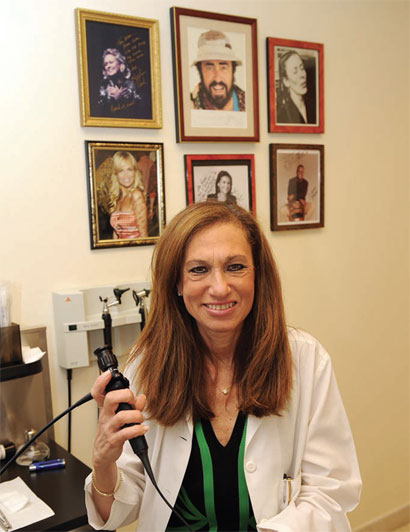
In the key of MD: Otolaryngologist Gwen Korovin ’80, with head shots of some of her famous patients. Photo: Enid Alvarez/New York Daily News
In the hours leading up to NBC’s live broadcast of The Sound of Music, the cast and crew scurried about their Long Island soundstage making last minute preparations. There, amid the fussing over sets, props, and costumes, was Gwen Korovin ’80. Her job: checking the vocal pipes of the production’s lead actors, in an effort to ensure that every do-re-mi was pitch perfect.
Korovin is used to racing from her Upper East Side office to film sets, Broadway theaters, and concert venues. For the past two decades, she’s been the ear, nose, and throat doctor for some of the world’s biggest entertainers including Lady Gaga, Pink, Mick Jagger, Patti LuPone, and Liza Minnelli. She once flew to Detroit to see an ailing Luciano Pavarotti. She got Hugh Jackman through the nearly year-long run of The Boy from Oz without missing a single show. John Mayer came to her when he was struggling with his much-publicized vocal troubles.
Celine Dion has the CALS grad on speed-dial, too. Years before she shot to superstardom, the panicked singer flew to New York for another opinion when two Canadian doctors recommended surgery on her swollen vocal cords. Instead, Korovin suggested anti-inflammatory drugs and two weeks of total silence. Dion heeded her advice—and came back from a vacation with her throat completely healed. “Had they done surgery on her, I fully believe that they would have ruined her voice,” says Korovin, whom Dion thanked after winning a Grammy in 1999. “She wouldn’t have become the world-famous singer that she is now.”
Besides a conservative approach to treatment and extreme availability—Korovin often sees busy artists at night and on weekends—she offers emotional patients some much-needed hand-holding. “She’s so comforting,” says five-time Tony winner Audra McDonald, who started seeing Korovin as a freshman at Juilliard. “She’s not an alarmist at all.” McDonald was battling a cold when she played Mother Abbess on the Sound of Music special, but the theater veteran knew she could perform. Still, she was concerned that belting out demanding tunes like “Climb Ev’ry Mountain” while ill could do permanent damage. Korovin assured McDonald that she could go on worry-free.
That’s another reason the actress is an admirer: with Korovin, the patient always comes before the production. During 2012’s Porgy and Bess on Broadway, McDonald developed a respiratory infection that caused her cords to inflame to a point where she could no longer sing. More alarming, she says, a blood vessel came close to rupturing—something that could’ve ended her career. Korovin went to the producers and insisted that McDonald bow out for several weeks to recover fully. “She’s an absolute advocate for her patients,” says McDonald. “She’s a total dragon slayer.”
A Brooklyn native, Korovin became interested in otolaryngology after she took an elective course as a student at SUNY Upstate Medical University, seeking to learn more about her father’s hearing loss. In 1989 she began working with Wilbur Gould, a throat surgeon renowned for treating politicians and performers like John F. Kennedy, Lyndon Johnson, and Elizabeth Taylor. She took over the practice after Gould died in 1994, and many patients stayed with her.
When it comes to advocating for patients, Broadway star Audra McDonald calls Korovin ‘a total dragon slayer.’After starting out nervously tending to luminaries like Frank Sinatra, Korovin now takes calls from celebrities in stride. Her office walls are covered with signed photographs. (The one of TV chef and talk show host Rachael Ray, who had a benign cyst on her vocal cords removed by Korovin in 2009, is inscribed, “Can I pay you in food?”) But you don’t have to be an A-lister to get an appointment: Korovin estimates that a third of her patients are teachers, lawyers, and other non-performers. “I honestly try to treat everybody the same,” she says.
Though Korovin aims for the best outcome for every patient, she concedes that there’s “a little more angst” when it comes to those who are high profile. That was never more apparent than when Julie Andrews walked into her office in 1997, shortly after having an operation to remove non-cancerous throat nodules. Korovin had advised the beloved Oscar winner against surgery; she went ahead anyway with another physician, resulting in the permanent loss of her four-octave vocal range. “She came into my office and could barely speak,” recalls Korovin. “I looked—and I actually walked out of the room and started crying.”
With younger singers, Korovin tries to protect them from future difficulties. She has treated pop star Ariana Grande since her 2008 debut in Broadway’s 13, and given the twenty-year-old’s meteoric rise in the last year, Korovin encourages her to get plenty of rest and go through proper vocal warm-ups. As a thank-you, Grande gave her a special gift: a platinum record commemorating 2 million copies sold of her top-ten single, “The Way.”


